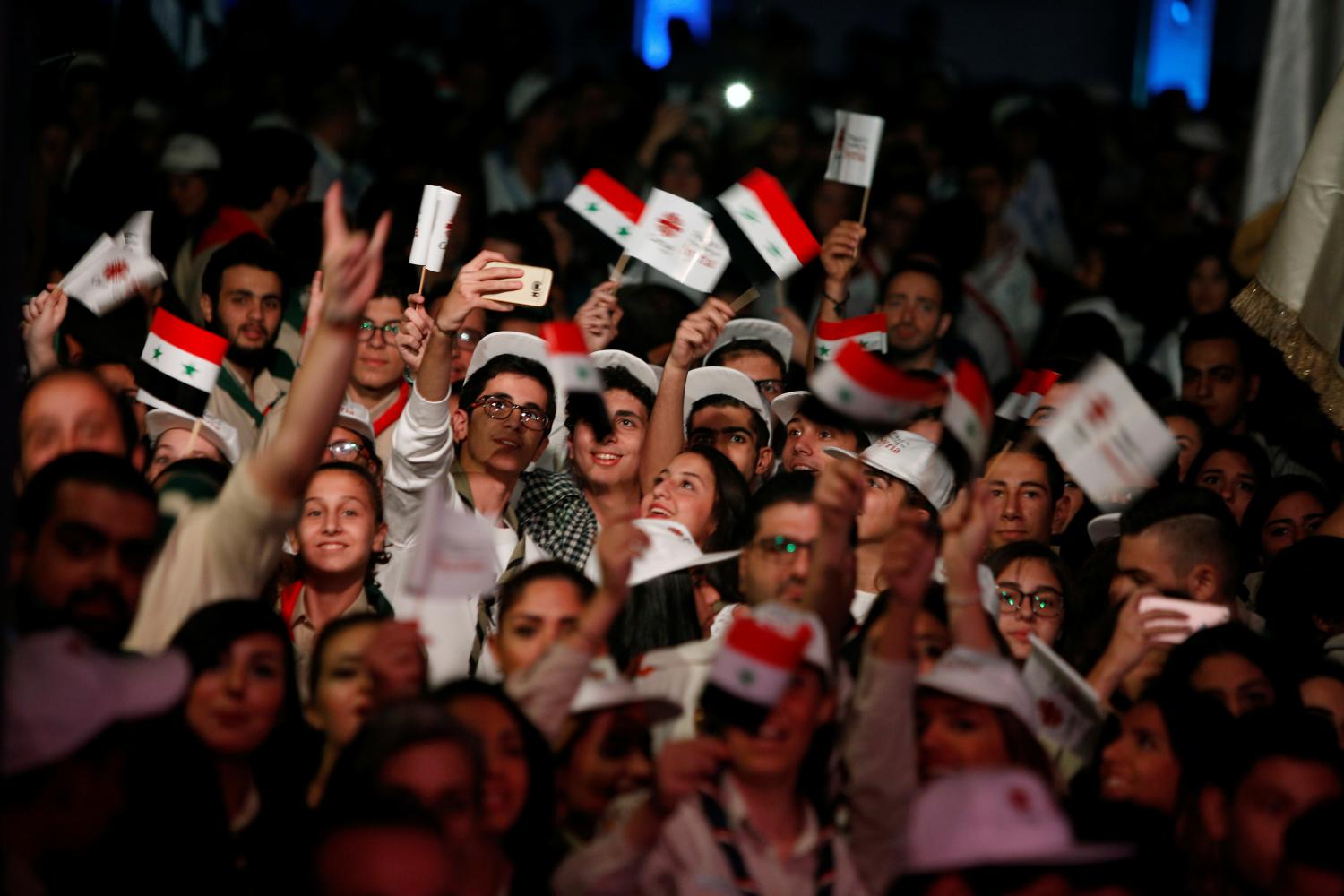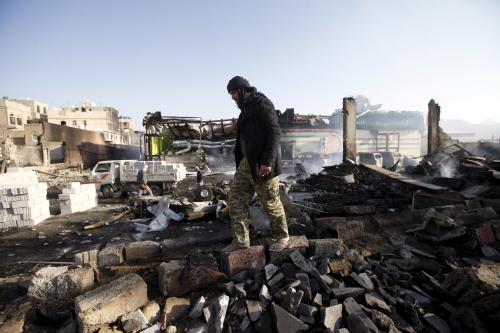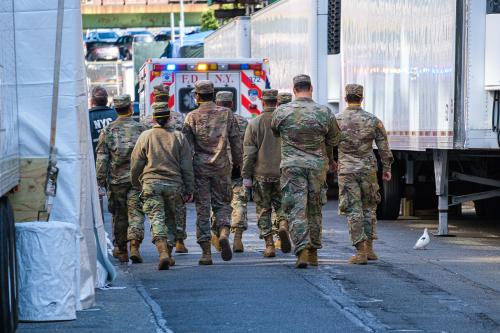The upending of the Middle Eastern order since 2011 came about primarily because of failures of governance. We must properly understand the why and how of this Middle Eastern breakdown if we are to recognize and commit to the work that is truly necessary to build a new, secure, and durable regional order. Investing in sustainable governance is important for the world and for the rising generation of young Arabs, who can either become a force for tremendous progress or a generation lost to violence and despair.
How and Why the System Collapsed, and What It Means
The regional collapse since 2011 is the outcome of a long-standing crisis in state-society relations in the Arab world—one that took several decades to germinate. Regional governments failed to adequately address this brewing crisis, and indeed some of them undertook policies that only exacerbated the problem. When popular uprisings burst into the open in 2011, many leaders responded poorly, deepening societal divisions, weakening institutions, and enabling the growth of violent extremist movements.
Several states have now collapsed into civil war, but more remain vulnerable to instability. The drivers of change exist all across the region, in every environment. No state is immune from the imperative to reform governance into a more sustainable form. The manner in which the regional order broke down and the past five years of turmoil and disappointed expectations have generated a crisis of order and a crisis of authority. The lack of trust between citizens, political leaders, and governments is perhaps the most daunting obstacle to the restoration of regional stability. Understanding how and why the Arab state system collapsed in 2011 reveals that the capacity of Arab states to address local and regional security threats depends in large part on structuring their political institutions and repairing the breach between states and society. The failure to revise governance, by contrast, will invite escalating security challenges.
The future of the region will largely be determined by the quality of governance, not its mere existence. Governance that will last, and that positions states to be effective and reliable partners in maintaining regional stability, will have four key characteristics: it will be more inclusive, more transparent, more effective, and more accountable. Liberal democracy is far more likely than any other regime type to exhibit these characteristics, and the hunger for democratic self-government endures today. But the path to democratic government is neither swift nor linear.
Existing Models for Governance
Five years after the Arab uprisings, and with the failure of all but one effort at governance transformation, we look across the Arab world and see several failed or failing states, new authoritarian models, and a number of recalcitrant autocracies holding on through a combination of heavy spending, increased coercion, and the soft bigotry of low expectations generated by fear both at home and abroad (“At least we’re/they’re not ISIS”). Three models contend for dominance in today’s Middle East: fragile democracy (Tunisia); order through savagery (ISIS); and renewed authoritarianism (Egypt under Sisi). The latter two models do not offer a stable or successful path for the future of Middle Eastern states. Given the level of violence suffusing the region, the fear and mistrust that suffuse local populations, and the ugly “race to the bottom” underway where extremism and authoritarianism compete as alternative models for Arab governance, it is no surprise that many—publics, elites, and external powers—express a degree of “buyer’s remorse” about the Arab uprisings of 2011. But the breakdown of social trust, particularly in societies now enmeshed in conflict, makes it hard to imagine how a new social contract could be negotiated, established, and implemented. Imposing a new social contract from the top down is unlikely to produce a stable positive outcome.
How to Build Sustainable Governance?
Because of the twin crises of order and authority generated by the regional breakdown, Middle Eastern states will simply not succeed in reestablishing an effective social contract and generating sustainable governance using the same (top-down, exclusionary) model as before. To begin repairing trust between citizens and government, and reestablishing the authority of state institutions through consent, governments in the region must focus on several priority areas:
- Ending civil wars is paramount—but so is fixing governance in existing states.
- Inclusive governance and the avoidance of violence demand respect for human rights.
- Prioritize the justice sector.
- Build opportunities for youth participation.
- Cultivate platforms and skills for dialogue and conflict resolution.
- Nurture and elevate civil society.
Recommendations for U.S. Policy
Over the past five years, U.S. policy toward questions of domestic governance in the Middle East has swung dramatically between over-involvement and under-involvement—and at both ends of this pendulum, officials have found themselves frustrated at the results. While the United States certainly cannot determine outcomes in the region, its presence and influence is still sizeable, indeed unmatched for an actor outside the region. At the same time, Americans have a particular case of whiplash about governance in the Middle East: all the optimism they experienced at popular prodemocracy mobilization in 2011 has turned to dismay and worry at the metastasizing violence that characterizes the region today.
Given this recent history, and the legacy of the Iraq War, many American policymakers today observe the existential challenges facing the region’s governments and conclude that American leverage to shape the region’s trajectory is limited. But it is not zero. More than anything, the United States’ global and regional leadership enable it to shape the environment within which Middle Eastern actors make decisions about how to behave. The question for American policymakers is how their country can play its limited role in a way that maximally supports progress toward sustainable governance—and therefore toward stability—in the region.
U.S. officials must keep firmly in mind that the underlying vulnerabilities that produced this upheaval and gave space for ISIS and al-Qaeda still exist across the region. Without addressing these underlying problems, those urgent security threats will simply keep popping up in different places and ways. The competition to establish new norms for governance in the Middle East is, in fact, the conflict that will determine the future of the region—it is the ground on which geopolitical, sectarian, and other conflicts are playing out. Actors pursuing paths other than effective and accountable governance may succeed for a time, but at the cost of great violence and, ultimately, at the price of regional stability. The United States cannot remain neutral with respect to this competition—and right now, it appears to be pushing in the wrong direction. Some lessons emerge from recent experience that should inform future U.S. efforts to advance more sustainable governance in the Middle East:
- Rebuilding regional stability requires a sustained investment in improved governance.
- U.S. officials should enunciate clear principles for what it will take to restore regional stability, and consistently evaluate regional development through the lens of what will and will not advance durable governance in the region.
- U.S. policymakers should prioritize increasing and intensifying all forms of engagement and exchange between Americans and the peoples of the Middle East.
- American and international planning for ending the region’s civil wars and for post-conflict stabilization and reconstruction must integrate the lessons in this analysis regarding sustainable Arab governance.
- U.S. policymakers should avoid creating moral hazards in bilateral relations with regional governments, particularly by over-securitizing bilateral relationships.
- The United States should devote greater support to governments that are using political compromise instead of violence to resolve disputes.
Ultimately, building societies that are resilient in the face of sectarian conflict and terrorist violence requires more effective, responsive institutions that can win citizens’ trust and loyalty, and more fair and functional systems that can offer the region’s majority, its young people, meaningful opportunities to achieve their ambitions for themselves and their communities. The project must give young men and women reason to invest in their hopes for this world, instead of hastening their progress toward the next one. Sustainable governance in the Middle East is an imperative for the security of the region and the world—urgent, and worthy of thoughtful, persistent investment by regional and global leaders. There are no more alternatives to experiment with, and no more time to waste.



